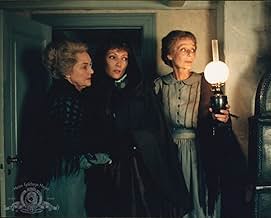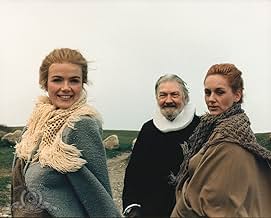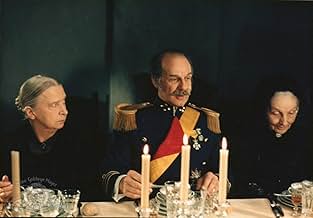NOTE IMDb
7,8/10
23 k
MA NOTE
À la fin du XIXe siècle, une communauté religieuse stricte dans un village danois accueille un réfugié français de la guerre franco-prussienne au service des filles du défunt pasteur.À la fin du XIXe siècle, une communauté religieuse stricte dans un village danois accueille un réfugié français de la guerre franco-prussienne au service des filles du défunt pasteur.À la fin du XIXe siècle, une communauté religieuse stricte dans un village danois accueille un réfugié français de la guerre franco-prussienne au service des filles du défunt pasteur.
- Réalisation
- Scénario
- Casting principal
- Récompensé par 1 Oscar
- 11 victoires et 8 nominations au total
Stéphane Audran
- Babette Hersant
- (as Stephane Audran)
Jean-Philippe Lafont
- Achille Papin
- (as Jean Philippe Lafont)
Ghita Nørby
- Narrator
- (voix)
Asta Esper Hagen Andersen
- Anna
- (as Asta Esper Andersen)
Avis à la une
This delicately told and moving story about the two devout daughters of a Danish Lutheran minister and their French servant is one of the finest European films of the 1980s. Set in a small, remote, austere Danish seaside town in the mid-19th century, the daughters devote their lives to continuing the work of their father in service of God, and in care for their needy townspeople. One of the daughters had turned down a promising opera career -- and the love of her French voice coach (a famous opera singer himself) -- to remain with her father and the town. Many years later the French singer sends a woman (Babette) -- who had lost her family in an outbreak of civil war -- to live with the sisters. She turns out to be an excellent cook, housekeeper and a shrewd shopper. The story culminates in a sumptuous feast prepared by Babette coinciding with a memorial to the reverend minister's 100th birthday. This delicious screenplay was adapted from the Isak Denisson (pen name for Karen Blixen) short story originally published in the Ladies Home Journal.
This movie is almost unknown, but it is very good. In a lonely Danish town, two old sisters live remembering a far youths, when, due to a strict puritan education, they had to reject happiness. Lonely, then, the live in a dignified austerity, until Babette, who flies from Paris, frightened by the horror of the war, arrives. In few time, she will be able to turn the goodness and love she received when she arrived. A good lottery prize lets her organize a great banquet, following the best rules of French gastronomy. All neighbourhoods are invited (all fanatically puritans). They accept, but they pact to not show any trace of pleasure or enjoyment, as it would be a sin. However, the seductive force of the delicious meal they eat, that they become seduced by the sensuality of French gastronomy. The banquet end in a very felt, though quietly, happiness. The love between humans has awaken. The miracle of rise the human kindness due to the pleasure of the sense has begun. The movie is surprisingly good, but it is not for all tastes. During most of the movie, nothing happens, all is so quiet and so peaceful, that during many minutes, you can only see the life of the inhabitants of the town. But, as the movie develops, it becomes more precious, when Babette wins the lottery prize (after 30min movie), the show begins. The author is able, with a perfect directing, to show us how Babette prepares the banquet, how she mixes all the ingredients with the most wonderful one (Love), all told in a quiet delicious way, with a perfect knowledge of photography and acting. Then, as the banquet goes by, the quality in showing us how the mood of all eaters changes due to the meal, only with first shots, with impressively filmed scenes one after another is simply astonishing. In addition, the tact with the colours and the photography is also superb, almost every scene of the movie is like a picture, so work is involved there. If you are able to admire good cinema and are able to realize that sometimes the way on telling you something rather than what is told is more important, this is your movie. If you happen to like good meals and just love the good gastronomy, probably, you'll feel amused, as most feelings of the movie will be familiar to you. An Oscar totally deserved. The only problem is its slowness at setting up the story, but, I can forgive it (I hope everyone too)
Stephane Audran is the eponymous heroine of this beautifully measured study of a small Danish community towards the end of the last century. Two beautiful and musically talented sisters give-up their own prospects of happiness and marriage in order to look-after their ageing father. One day, a French woman, Babette, comes to work for them. After some years she wins the lottery and is determined to do something for the sisters who have taken her in. Her solution is to prepare an exquisite and sumptuous feast, which changes the lives of all those invited. This is a film about human and cultural interaction, reflected in the changing language of the dialogue from Danish to French, and especially between the dutiful sobriety of Protestant northern Europe and the sensuousness of the Catholic south. It is also about human needs, and how warmth and kindness can be expressed and stimulated through the cultivation of the senses. A profoundly uplifting film.
"Babette's Feast" proves that not all film theories and formulas are true 100% of the time. Here's a story where there is no life-or-death conflict, no raging anger, no violent outbursts. Nothing blowed up real good, and there is nothing resembling a chase scene. The conflict is about the ways in which people can be nice to each other. Their personal differences of passion or conviction are not as important as the ways in which they can connect with each other.
How shockingly refreshing.
There is an undercurrent to this film that gives it the feel of a Garrison Keillor monologue, in that it is built around people's personal foibles and quirks.
Even more refreshing is how "Babette's Feast" manages to be nice without becoming cloying, saccharine, facile, superficial or insincere. People's personal passions are portrayed not only from their own perspective, but from the perspective of the people they affect, with more realism than you usually get in film, yet also with sincere and infectious optimism.
If you don't come away from "Babette's Feast" smiling and feeling better, then you must have been distracted from giving it your full attention. This is one of those very rare films that you can recommend to everyone you know. It is truly in a class by itself. Like Mary Poppins, "Practically perfect in every way."
Utterly charming and subtly stunning.
How shockingly refreshing.
There is an undercurrent to this film that gives it the feel of a Garrison Keillor monologue, in that it is built around people's personal foibles and quirks.
Even more refreshing is how "Babette's Feast" manages to be nice without becoming cloying, saccharine, facile, superficial or insincere. People's personal passions are portrayed not only from their own perspective, but from the perspective of the people they affect, with more realism than you usually get in film, yet also with sincere and infectious optimism.
If you don't come away from "Babette's Feast" smiling and feeling better, then you must have been distracted from giving it your full attention. This is one of those very rare films that you can recommend to everyone you know. It is truly in a class by itself. Like Mary Poppins, "Practically perfect in every way."
Utterly charming and subtly stunning.
One evening when I was working in the lab, I developed this intense pang of hunger. I decided to go downstairs to the cafeteria and scrap together a dinner when I noticed a few random folk gathered in front of the adjacent theater. Since the building was usually empty by that hour I couldn't help feeling curious and since I always eavesdrop on conversations I soon discovered that they were showing old films in the theater. So, I bought a few vendor snacks and decided to join them for a viewing. That was one of the best work related decisions I ever made as an undergrad. That movie made me reconsider my second shift job at the lab and check out enrollment into the local culinary art schools. Well, I didn't become a chef but I did abandon biology for a more creative outlet and realized that being home before dinner is an important part of better living. Babette's Feast - a movie that had me reevaluate my life and consider a career change. How many flicks do that? Best movie ever.
Le saviez-vous
- AnecdotesFirst Danish movie to win an Academy Award for best foreign language film.
- GaffesIn 1871 Babette pays with skilling, which was the currency used at that time; 14 years later, Babette still uses skilling, but Denmark changed the currency in 1875 from skilling to kroner and orer.
- ConnexionsEdited into Eventyret om dansk film 18: Nye perspektiver - 1970-1987 (1996)
- Bandes originalesWaltz No. 15 in A-flat major Op. 39
(arranged for orchestra) (uncredited)
Written by Johannes Brahms
Played during the dance hosted by the Royal family
Meilleurs choix
Connectez-vous pour évaluer et suivre la liste de favoris afin de recevoir des recommandations personnalisées
Détails
- Date de sortie
- Pays d’origine
- Langues
- Aussi connu sous le nom de
- El festín de Babette
- Lieux de tournage
- Sociétés de production
- Voir plus de crédits d'entreprise sur IMDbPro
Box-office
- Montant brut aux États-Unis et au Canada
- 4 398 938 $US
- Montant brut mondial
- 4 637 920 $US
- Durée
- 1h 43min(103 min)
- Mixage
- Rapport de forme
- 1.66 : 1
Contribuer à cette page
Suggérer une modification ou ajouter du contenu manquant































